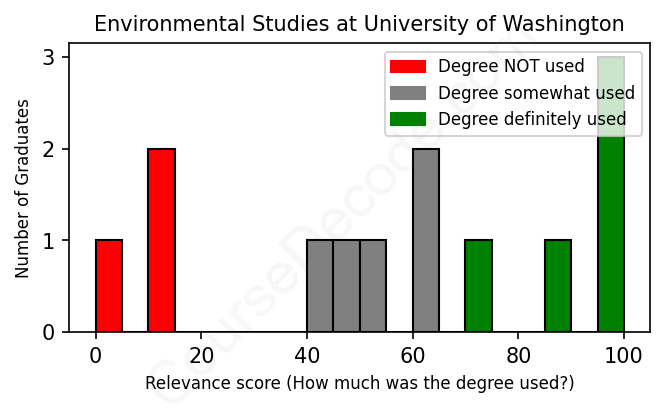
First, some facts. Of the Environmental Studies graduates from University of Washington we've analyzed , here's how many have used (or NOT used) their degree in their career:

These are estimates based on AI analysis of 13 LinkedIn profiles (see below).
The verdict? Below average. Overall, with an average relevance score of 57%, Environmental Studies graduates from University of Washington have a lower likelihood (-10%) of finding work in this field compared to the average graduate across all fields:
And for comparison, here's the chart for all profiles we've looked at across all degrees.
Also, after graduating, only 30% of these graduates have pursued further education other than another Bachelor's degree (such as a Masters degree or other), compared to the average across all profiles of 35%. This suggests a Bachelors degree is enough for most Environmental Studies graduates, and it's normal to look for work straight after graduation.
See the details:
|
Relevance score: 86% We think this person has gone into a career highly relevant to their degree. We think this person has gone into a career highly relevant to their degree.
DEGREE INFOGraduated in 2016 from University of Washington with a Bachelors Degree in Environmental Studies. No other secondary education since. JOB HISTORY SINCE GRADUATIONManager Flowerworld Feb 2016 - Jun 2018 Seed Program Manager  Mast Reforestation Jun 2018 - Present ABOUTOrganizer. Activist. Honest Individual. Organizing working class solutions for people and planet. |
The top 10 most common jobs done by the graduates we've analyzed (ranked most common to least) are:
From analyzing the job profiles of graduates with a degree in Environmental Studies from the University of Washington, it seems like a pretty diverse range of positions have been taken up. Some of the most common jobs include various roles related to sustainability and environmental advocacy, like Project Consultants, Outreach Coordinators, and numerous internships with organizations like the Surfrider Foundation and the EPA. Many graduates have found positions that directly link back to their Environmental Studies background, especially those focused on issues like urban planning, coastal management, and ecological restoration, which clearly leverage their education. There’s a strong presence of roles in advocacy and educational outreach, which suggests that many graduates are keen on promoting sustainability and environmental awareness in their communities.
However, it’s not all sunshine and rainbows regarding relevance. Several graduates ended up in roles that don't really tap into their Environmental Studies knowledge, like those in administrative or legal functions that focus more on management than on environmental impact. For instance, jobs as paralegals or in retail management show that while the degree provides a solid grounding in environmental issues, not all graduates are applying that knowledge directly in their careers. Overall, the linkage between their jobs and Environmental Studies varies widely, with a solid chunk of the workforce making headway in positions highly relevant to the field, while some drift into less connected roles. It’s kind of a mixed bag where passion meets practicality, but many are still striving to make a difference in environmental domains!
Here is a visual representation of the most common words in job titles for Environmental Studies graduates (this is across all Environmental Studies graduates we've analyzed, not just those who went to University of Washington):

Looking at the career trajectories of graduates from University of Washington's Environmental Studies program, it seems like there’s a pretty diverse mix of career paths. For many, the first job after graduation often leans towards internships or entry-level positions in environmental organizations, government agencies, or related fields. For instance, several graduates started as interns at places like the EPA or non-profits focused on conservation and sustainability. These initial roles tend to involve a lot of hands-on experience, which is great for building skills and networking in the environmental sector.
As for where they end up five to ten years later, there’s a bit of a split. Some graduates appear to have successfully transitioned into solid careers related to their degree, taking on roles like program coordinators, project managers, or specialists within nonprofits and government organizations focused on environmental issues. Others, however, seem to have drifted away from the traditional environmental career path, finding themselves in roles that are less directly tied to their studies, like administrative or legal positions. Overall, while many graduates are making strides in relevant fields, there’s also a noticeable portion who may not be fully utilizing their Environmental Studies education, which is something to keep in mind if you're thinking about what path you’d like to take after college!
Honestly, pursuing a Bachelor’s degree in Environmental Studies at the University of Washington can be a mixed bag in terms of difficulty. It’s not the hardest degree out there, but it definitely has its challenges. You’ll cover a lot of ground, from science and policy to social issues—so if you're not into those subjects, it could feel a bit overwhelming at times. Plus, there's usually a good amount of group projects and fieldwork, which can be super engaging but also require time and teamwork. Overall, if you’re passionate about the environment and willing to put in the effort, it’s definitely manageable and can even be enjoyable! Just be prepared to stay organized and keep up with readings and assignments.
Most commonly, in the LinkedIn profiles we've looked at, it takes people 4 years to finish a Bachelor degree in Environmental Studies.
Looking at these graduates from the University of Washington, it seems like they’re navigating a variety of paths that don't necessarily scream "big bucks," especially early on. Many started off with internships and entry-level positions that typically don't pay a hefty sum, like interns at non-profits or governmental roles. They’ve slowly progressed into more stable roles, but it seems like salaries in fields tied to environmental studies often don’t skyrocket compared to sectors like tech or finance. Some are climbing up the ladder with decent roles, like an Engineer Trainee or a Program Coordinator at sustainability-centered organizations, but I’d say they're likely making a modest living—enough to get by, but not exactly rolling in it. So, while they’re doing meaningful work, it might not show up in their paychecks just yet!
Here is a visual representation of the most common words seen in the "about" section of LinkedIn profiles who have a Bachelor degree in Environmental Studies (this is across all Environmental Studies graduates we've analyzed, not just those who went to University of Washington). This may or may not be useful:

Here are all colleges offering a Bachelor degree in Environmental Studies (ordered by the average relevance score of their Environmental Studies graduates, best to worst) where we have analyzed at least 10 of their graduates:
| College | Score | Count |
|---|---|---|
 California State University-Sacramento California State University-Sacramento
|
89 | 10 |
 University of Vermont University of Vermont
|
72 | 21 |
 University of California, Santa Barbara University of California, Santa Barbara
|
69 | 24 |
 University of California, Santa Cruz University of California, Santa Cruz
|
59 | 31 |
 Florida State University Florida State University
|
57 | 10 |
 University of Washington University of Washington
|
57 | 13 |
 UC Santa Barbara UC Santa Barbara
|
57 | 15 |
 University of Oregon University of Oregon
|
56 | 13 |
 University of Colorado Boulder University of Colorado Boulder
|
53 | 24 |